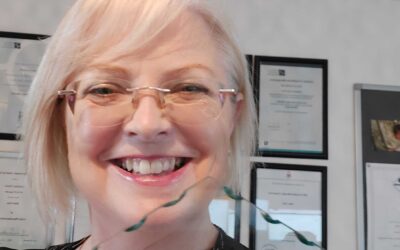A Personal History of Filling the Deficits and Seeking Diagnosis
Supporting a friend or family member who has declining cognitive function is hard for anyone. To begin with everyone has their own quirks, and occasional odd behaviours which can be seen as a character trait, or eccentricity. So, when do you start to think that it might be something more, and what can you, or should you be doing?
My mother started work as an articles clerk at a Chartered Accountants’ office in 1959. She later met and married my father and they ran their own business, growing, selling, exporting and importing fresh cut flowers. My father was responsible for the outdoor side of the business, my mother ran the accounts and administration side. There were 2 children, my elder brother and me.
Our father died December 1996. To begin with, aged 59 my mother was sad, and lonely, as to be expected, but she had a large extended group of friends, and lots of invitations to stay with people in the UK and overseas. She travelled, finished her Open University course and was awarded a humanities degree at 60, at the age she retired.
Deciding a large house and garden were an unnecessary responsibility for a single person, who travelled a lot, Mother moved to a new flat, and a new cleaner, and sold the house at 65. All seemed to be going well, until her car was damaged in a mysterious incident where she had exchanged insurance details, and had damage in line with the other party’s report, but no memory of it. There were a couple of further small bumps and scratches on the paintwork after that, which she also knew nothing about. She was starting to forget conversations and repeat herself, but we thought this wasn’t hugely out of character. Mother was increasingly wanting family to visit, and reluctant to let people leave, and we were starting to get mildly concerned. My brother and I suggested to her applying for a Lasting Power of Attorney, to be able to enact it if and when required. This offer was rejected.
Then….she started a relationship with a gentleman who she first met at primary school. They had a lot in common, and we all experienced a few years without having to worry. They travelled in his very nice vintage car, went on cruises, visited friends and family, had meals out. Mother was volunteering for Victim Support, and the local Day Hospice, as well as being a member of the U3A, studying music and philosophy.To be honest there were times I was quite envious. My brother and I were starting to get more involved in her financial affairs, as she was asking us for advice, but she was still managing her own commercial concerns, and submitting annual accounts.
2011, when Mother was 73, I planned a trip to Scotland with her, my daughter and grandson. Everything was booked, and we were staying in a friend’s cottage. I received a phone call the day before we were due to leave. Mother was in A&E, she had been writing a letter, and her hand wouldn’t work, then her speech was slurring. She was quickly diagnosed as having had a Transient Ischemic Attack (TIA), given soluble aspirin and discharged to go to Scotland.
She was fine on the trip, and return home to her hectic social life. Her MRI showed no signs of Alzheimer’s although I remembered the phrase “if there is any possibility of problems in the future, it would be vascular”. Mother Heard “I do not have Alzheimer’s” and nearly skipped out of outpatients. However, things had started to change. She found everyday paperwork and bills annoying and frustrating, so I started to check her bills and write cheques for her to sign. I took on the annual accounts, and we reintroduced the idea of an LPA, this time she accepted and it was submitted.
When I found some cheques had been written to highly inflated values, I pointed out the potential impact it could have had on her finances, and Mother agreed that we should enact the LPA.
It was becoming harder for her to run her daily life, and her partner was also becoming deaf and forgetful. I arranged for her tablets to be dispensed in dosset packs and bought myhomehelper. A tablet device was installed (taken out of the box and plugged in) in her home 2015, and the home of her partner. This is a digital diary system which is entered online and allows me, and other family members to put diary entries and reminders. It also allows for photographs to be stored on the system, which was a really good way to get her into the habit of looking at it. It has made a huge difference, which could only really be seen when it “didn’t work” (she had switched it off accidentally, didn’t realise, and couldn’t switch it back on again) – she didn’t know what day of the week it was, and had crossed out dates in her paper diary, because the diary was wrong! That was a confusing few days for all of us.
There were a few health scares: an infection that wouldn’t shift; weight loss; query internal bleeding and some very strange and confusing conversations. Her gait changed, each step getting increasingly shorter, and pausing before placing each foot on the stairs. I checked the deepest recesses of the fridge and found food so old that it could well have turned into a new lifeform. My concern was growing.
Every week, I would be asked by her what all her tablets were for, and every week I would explain them all.
Around the same time as installing the myhomehelper I checked her medication and found that she had been on one drug for more than the recommended 5 years. This is tricky for me, I’m not a medic, I work on the commercial side of healthcare, so I have to be careful. Not only was she on this medication for more than the recommended time, I also knew that the medication affected blood viscosity – something the GP disagreed with,until reading the BNF. I must be just the sort of relative a GP doesn’t want with a patient. The drug was stopped.
Now, this could be me reading too much into this, but the number and severity of confused episodes seem to have reduced since then.
I was added onto her medical notes for permission to speak to medical staff directly, and used this opportunity to ask for a referral to the memory clinic December 2016.
She was seen at the TIA clinic (this was made as an urgent appointment, as apparently it should have been booked 2011). Unsurprisingly, there were no issues, but I did ask if 5 years on aspirin was a long time as antiplatelet therapy, and she was switched to Clopidogrel. Another MRI was requested.
I started to notice that there were tablets remaining in the dosset box that should have been taken, and although she had stopped losing weight, weighing just over 7 stone, I was concerned about her overall physical wellbeing. Living an hour away and working full-time, I wanted to know that someone would see her every day. I tried in vain from November 2016 to April 2017 to find local homecare, not quibbling on price, I contacted every provider on the CQC website that covered her area, left messages and spoke to staff – Nothing. So, very fortunately, a family friend who was looking for part-time work agreed to an hour a day. Huge relief. He is switching on the computer, helping her find emails, taking her shopping and making sure the food in the fridge is fit for consumption, and making sure that she eats. Her weight is back up to the usual 8 stone, and she has filled out to a more healthy size.
In August we had a visit from a lovely nurse who was part of the community team for memory services (following the December referral), a full assessment was conducted, and the MRI was reviewed.
We have a diagnosis!! Mild Cognitive Impairment (MCI), apparently, we are already doing all the right things. It might seem an odd thing to say but I’m relieved to know that this has been acknowledged and that she is on a caseload. We have a point of contact. On the other hand, I might not be a health professional, but I know more than the majority of the general public and it isn’t easy. Understanding potential developments and risks, I have been able to anticipate some problems. We don’t know what we don’t know, and I hope that services will develop so that more people are informed about how to face these issues, and what resources are available. As it is, I take the position that each change is another problem to be overcome and worked around in order that my mother can continue to enjoy a busy social life, and independence.



